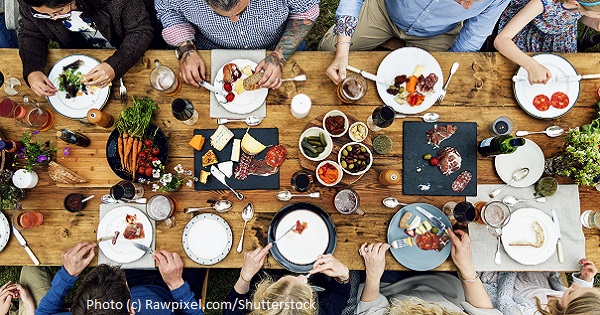|

Dine Out or Dine In
By Gene Sager
My circle of friends often invites me to join them for lunch at a restaurant or brewery. The more the invitations, the more I have pondered this trend. Eating out is fun, easy, and tasty. But we need to heed the wisdom of the old adage about the stone tossed into the pond: The ripples go out to every shore.
Dining Out
My friends’ favorite restaurant is a funky place bearing the unlikely name “Chez Smitty’s.” Smitty’s features a $5.00 lunch special called the Stamina Lunch. Recently, the Stamina meal was spaghetti, buttery garlic bread, and salad. Smitty himself was willing to answer my questions about the food. He remained implacable as he described what was very disturbing to me. The pasta is not whole grain and not organic. The salty tomato sauce and salad are not organic. The bread is not whole grain (no surprise), but most troubling was Smitty’s foggy response about the “buttery” spread. It is not butter; it’s a spread that tastes like butter. Smitty said, “I looked at the ingredients list, some oils and other things I couldn’t understand. Anyway, it tastes good.”
Chez Smitty’s is an unappointed spot with an unusual name but the fare is the usual. The usual American fast or slow food restaurant fare: not organic, not whole grain, not local, with indiscriminate use of oils, salt and sugar, and some mystery ingredients unknown to the owners and managers. Most of us are not used to raising questions about ingredients at a restaurant. But why not? If we are committed to eating a healthful, green diet, then we should be clear: Most restaurant food is unhealthful and ungreen. The ripple effect goes to the detriment of our health and the health of the planet and all who live on the planet. And we should also consider the health of the farm workers; non-organic food production yields direct toxin exposure to the workers.
What about purchasing restaurant food and eating it at home? Picking up dinner on the way home or having it delivered is the preferred combination for many, but take-out food is a double detriment for the earth. Besides the problems caused by non-organic products, pick up or delivery means Styrofoam, paper, and plastics – many of which are not recyclable in most places. Much of the paper is chemically treated to resist moisture, and boxes get too greasy to recycle. In areas without curbside compost pick-up, greasy pizza boxes, especially, wind up in the landfill with most of the rest of the carry-out or delivery materials. Beyond the landfill, the ripple effect even goes out as far as the garbage gyres in the oceans. Surely the vast pools of trash, mostly plastics, in our oceans are sad commentary on our species and cause of great shame.
Dining at Home
Now, consider a dinner prepared and eaten at home. The flipside of the effort involved in this is that you control important matters, like the ingredients of the meal! These, and myriad details that matter, such as the temperature, the noise level, and the music or lack of it. The manager of the restaurant may like Kenny G, but my family does not.
Dinner at home can be a time to relax with family and share what may be pressing on our minds and hearts. Home is a place where we can create a sanctuary, but a restaurant is a public place, in that strangers are sitting at tables nearby and public protocols apply. At a restaurant, personal matters or prayer or meditation before the meal would not feel right.
I have heard it said that going out to eat as a family frees us from the chores of preparation and cleanup and gives us a chance to bond. Actually, the reverse is true; dining out puts us in an artificial, public environment and deprives us of the elbow-to-elbow preparation and clean up experiences that bring us together. I make the salad while my son makes the guacamole. My daughter is putting the finishing touches on the dessert and my wife is making the spaghetti sauce. Everyone helps clean up too, and in this way we have really shared a meal.
When we do it right, dining in can be healthful and green, and it supports family togetherness in ways that are impossible when we dine out.
Gene Sager is Professor of Environmental Ethics at Palomar College in San Marcos, California. He is a prolific and thoughtful writer on environmental and philosophical issues, and a frequent contributor to Natural Life.
|

